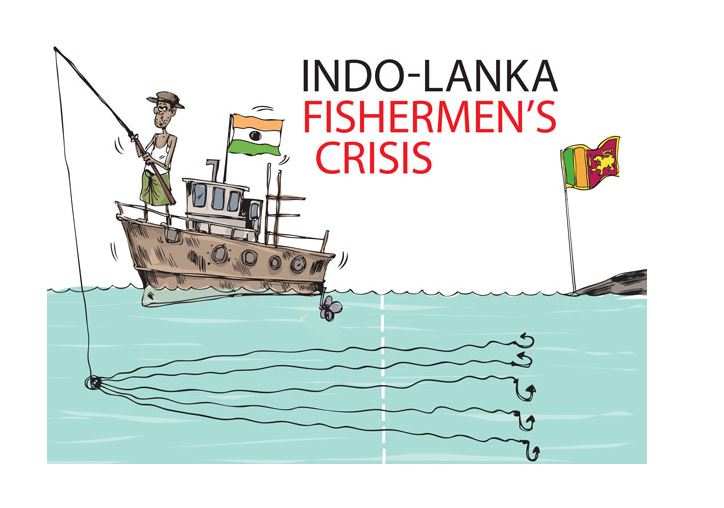India-Sri Lanka fisheries issues – Background and the way forward

Context: After a gap of 15 months, the India-Sri Lanka Joint Working Group (JWG) on fisheries held its much-awaited deliberations (in virtual format) recently.

This topic of “India-Sri Lanka fisheries issues – Background and the way forward” is important from the perspective of the UPSC IAS Examination, which falls under General Studies Portion.
Background of the issue
- As sections of fishermen from the Palk Bay bordering districts of Tamil Nadu continue to transgress the International Maritime Boundary Line (IMBL), cases of many of them getting arrested and their boats being impounded by the Sri Lankan authorities continue.
- Apart from poaching in the territorial waters of Sri Lanka, the use of mechanized bottom trawlers is another issue that has become a bone of contention between the fishermen of the two countries.
Trawling as an issue:
- The dispute is not just between the two states.
- Fishing by the use of mechanized bottom trawlers, which was once promoted by the authorities in India, is now seen as being extremely adverse to the marine ecology and has been acknowledged so by India.
- The actions of the Tamil Nadu fishermen adversely affect their counterparts in the Northern Province who are also struggling to come to terms with life after the civil war.
- The ongoing economic crisis in the island nation has only worsened their plight.
The need for transgression:
- The fishermen of Tamil Nadu experience a genuine problem — the lack of fishing areas consequent to the demarcation of the IMBL in June 1974.
- If they confine themselves to Indian waters, they find the area available for fishing full of rocks and coral reefs besides being shallow.
- Under the Tamil Nadu Marine Fishing Regulation Act 1983, mechanized fishing boats can fish only beyond 3 NM from the coast.
- This explains the trend of the fishermen having to cross the IMBL frequently.
- Another factor is that the people of the two countries in general and fisherfolk, in particular, have common threads of language, culture and religion, all of which can be used purposefully to resolve any dispute.
It is because of this factor as well as the plight of the fishermen of the Northern Province that the two governments have been repeatedly saying that the whole problem has to be looked at from humanitarian and livelihood angles.
Some considerations
Deep-sea fishing:
- While Indian fishermen can present a road map for their transition to deep sea fishing or alternative methods of fishing, the Sri Lankan side has to take a pragmatic view that the transition cannot happen abruptly.
- In the meantime, India will have to modify its scheme on deep-sea fishing to accommodate the concerns of its fishermen, especially those from Ramanathapuram district, so that they take to deep-sea fishing without any reservation.
Alternative livelihood measures:
- There is a compelling need for the Central and State governments to implement the Pradhan Mantri Matsya Sampada Yojana in a proactive manner in Tamil Nadu.
- The scheme, which was flagged off two years ago, covers alternative livelihood measures too including seaweed cultivation, open sea cage cultivation, and sea/ocean ranching.
- During the visit of India’s Minister of External Affairs, India had signed a memorandum of understanding with Sri Lanka for the development of fisheries harbours.
- This can be modified to include a scheme for deep-sea fishing for the fishermen of the North.
Joint research on fisheries:
- It is a welcome development that the JWG has agreed to have joint research on fisheries, which should be commissioned at the earliest.
Establishing a permanent multi-stakeholder institutional mechanism:
- The two countries should explore the possibility of establishing a permanent multi-stakeholder institutional mechanism to regulate fishing activity in the region.
Practice Question for Mains
- A pragmatic approach is the first option available to resolve the festering India-Sri Lanka fisheries issue. Examine. (250 words,15 Marks).

